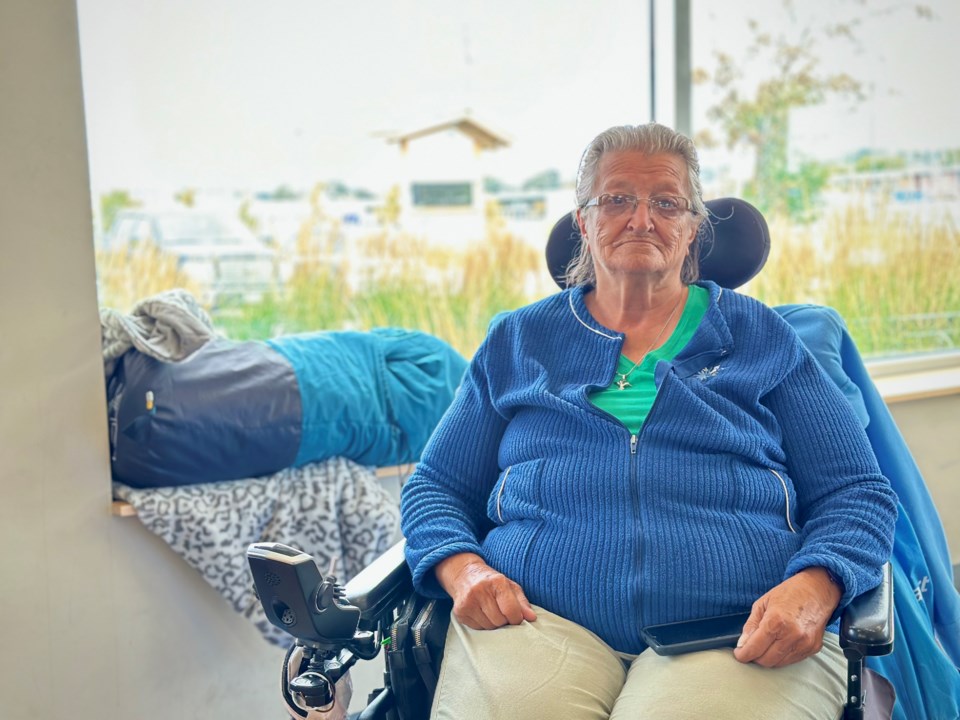Irma Brown has been staying at the Lighthouse since March, and she has been looking for her own place to live for months.
Although she has money set aside for rent, and a pension coming in every month, the problem is finding an affordable and wheelchair-accessible place to live.
Brown, 75, and Lighthouse housing worker, Sara Ulrick, have been applying to multiple housing units every week, but so far they have had no luck.
“It is depressing, very depressing, but we have to keep going,” Brown said. “It's a very hard thing.”
With no affordable options available to her, Brown ultimately had to rely on the Lighthouse — a journey that had multiple steps along the way.
During the pandemic, she rented a room, split with two others, in what she described as a “slum house” for $1,000 per month.
“The room that we had, with three people in it, it was kind of awkward,” she said.
When one of her roommates passed away, the landlord told Brown and her roommate they could stay so long as the bills were paid, but she found herself taking on the lion’s share of the bills, along with paying for gas when she needed to go anywhere.
“They didn't have the money and they never came up with even a little bit to help me,” she said. “While I did pay as much as I could, but you know, when you're trying to take care of your friend (who has) passed away and everything, it's kind of hard.”
“And you're paying for somebody to bring you around — $40 here, and $40 there for gas — it does run up.”
In the end, Brown and the other tenants were evicted from the apartment after it was declared an illegal dwelling.
“It was an illegal rooming house,” Ulrick explained. “Everybody in there received eviction notices. Because they had too many units in that apartment, the fire department came in and shut it down.”
From there, Brown temporarily stayed in a retirement home — an arrangement she had a hard time with.
“I just couldn't stick it out. It was just too much,” she said. “It's kind of a hard place to cope with.”
After a stint with the Lighthouse’s motel voucher program, which provides temporary motel accommodations for women and families, Brown ultimately wound up at the shelter on Queen Street.
Along with dozens of others, she has been looking for housing opportunities for months.
A growing trend
Stories like Brown’s are becoming more common at the Lighthouse, Ulrick said, with roughly 50 per cent of the shelter’s 58 residents ready to move on to housing.
With stiff competition for available affordable units in the city, some residents have been staying at the emergency shelter for an average of four months, and upwards of a year, where the average used to be about a month.
Ulrick said a lot of seniors have wound up at the shelter, along with youth and adults facing difficult financial times.
“We should never see seniors in here. They've paid their dues,” she said. “But we're seeing a lot more seniors; we're seeing a lot of youth coming through now, (and) lot of people who have just … lost their employment, or something happened and their finances got worse, and they ended up here.”
In turn, the shelter’s daily triage list — which prioritizes people in need of shelter for the Lighthouse’s available beds — can have up to 20-30 people per day, Ulrick said, where it used to average seven to eight people per day prior to the pandemic.
A part of the issue, Ulrick said, is that she has a hard time getting a response from landlords for the units that are available, saying it seems like some landlords would “rather have their units sitting empty, then giving them to people on (Ontario Works) or ODSP.”
While there are housing units available in the city, most are not affordable for those in the Lighthouse, she explained.
“You're looking at $900 to $1,000 for a room right now. The average (Ontario Works) is (about) $730,” she said.
In Brown’s case, though she has a pension, her credit score was impacted by the steep expenses she took on in her former accommodations.
“The credit score is not there, so people won't even look at it because she's not working or she's not a student,” Ulrick said. “They won't even return her calls or her emails. If I send the emails, there's a lot of stigma that comes with the Lighthouse email because they're coming from the shelter, so they don't even want to deal with us then.”
Brown’s need for a wheelchair-accessible unit has added further complexity to her housing pursuit.
While she does have some mobility, she is unable to climb a longer flight of stairs on her own.
“We've had quite a few emotional meetings, to the point where Irma is even willing to leave her wheelchair outside and go up a few stairs if that would mean she has housing,” Ulrick said.
In an effort to find housing, Ulrick said Brown has banded together with other Lighthouse residents to look for a multi-room dwelling.
“She teamed up with people that she’s met in the shelter to try and get housing with them … and still we're not getting anywhere,” Ulrick said.
“We need affordable housing in Orillia — desperately.”
The situation in Orillia is such that even Ulrick — whose job it is to help her clients find housing — had to stay in the Lighthouse’s emergency shelter while doing her job.
“I left my husband in 2020. I spent six months homeless. I lived in my van, and I couch surfed with friends and family; I actually stayed in the shelter that I currently work in,” she said.
“It took me six months to find housing. I was turned down so many times.”
Ulrick ultimately did find housing, but she had to look beyond the city to get it.
“I owned my own house for over 10 years. At that point, I screamed stability, and I could not get a rental,” she said. “I ended up finding a rental out of town. I don't even live in town. I pay over $1,800 (per month) as a single mother.”
Beyond the Lighthouse
While people experiencing homelessness are acutely impacted by today’s costs of living, there is a rapidly growing segment of the population struggling silently to scrape by.
In June, the Sharing Place saw a record number of people access its food bank services, with 2,387 people — including families, couples, and individuals — coming through its doors,
Last spring, in what was then considered a rather busy period for the food bank, the Sharing Place assisted around 1,500 people per month, or more than 50 per cent less than it served this June.

“People on low fixed incomes, like if you're on Old Age Security, if you have ODSP or (Ontario Works) coming in … when inflation hits, you have no extra income or savings,” said Chris Peacock, the executive director of The Sharing Place.
Prior to the pandemic, Peacock said 18 per cent of the community was considered low income, a figure he expects has grown amid rising housing costs and inflation in the years since.
“That, without a shadow of a doubt, obviously, (is) growing,” he said. “Those 18 per cent are now making significant sacrifices to what they purchase, to the point where they're making concessions where they're deciding to feed their family or their pets before they feed themselves.”
These days, if a low-income individual or family loses their housing, it can be extremely difficult to afford accommodations at the current market rates, Peacock said.
“If there's a housing issue in your life, where all of a sudden you're no longer able to stay in the accommodation (you’re in), you're screwed, because there's no place for you to be able to move into that's going to be at that rate," lamented Peacock.
Numbers at the Sharing Place have been climbing steadily since late last year, with numbers fluctuating between 1,748 individuals served to the recent record-setting month since January.
Peacock said food banks, like the Sharing Place, are increasingly looked to as a solution to poverty issues, when they are meant to be temporary fixes.
“The government is leaning on us to help stop the bleeding and solve the current situation, but we are only supposed to be used while the government truly solves the problems, when it comes to affordability of housing, income solutions … and improved access to mental health supports and addictions counselling,” he said.
Whether it’s through affordable housing or increased wages for low-income people, Peacock said something needs to be done — and quickly.
“Housing … is priority number one that needs to be addressed: affordable, deeply affordable housing stock,” he said. “Big picture solutions, that can create housing for people in middle and lower incomes, is essential.
“Those projects need to be built, and built fast.”
A race against time
Lighthouse executive director, Linda Goodall, said she is discouraged by how many people are in need of housing these days, but she is also encouraged by the fact that many are stepping up to find solutions.
“There is encouragement, there are people out there that are trying and are making a difference with affordable housing,” she said. “Yes, it's difficult, but (the government’s) also looking at pouring in funding to housing like never before.”
However, there is still tremendous pressure on shelters and food banks as affordable housing projects get built.
“The food banks and the shelters still have to manage all of this,” she said. “You can't put up housing in a day.”
Currently, there are 270 affordable housing units slated for development in Orillia, spread across four projects.
The largest, the County of Simcoe hub under construction at 250 West St. N., will bring 130 affordable units to the city. With construction underway, occupancy is expected sometime in 2024.
Construction on Kindred Works’ 48-unit townhome development at 175 Oxford St., which includes 15 affordable units and is expected to begin this fall, but the remaining two projects (at the post office and the gym/building on West Street) currently have no timeline for completion.
Beyond these developments, the city is working to build partnerships for affordable housing in conjunction with development of the new transit terminal at 66 Peter St. N.
The city is also working on a grant application to the Canadian Mortgage and Housing Corporation for increased affordable housing funding, and there is also opportunity to build affordable housing on vacant land at the Lighthouse.
Despite the efforts underway, Mayor Don McIsaac said he recognizes that more needs to be done.

“We’re doing all we can, but unfortunately it’s not enough,” he said. “There's four or five developments … that are in process now. They'll add units to the pool to help with affordable housing, but it's just not enough.”
A part of the issue, he said, is that developers often fail to include affordable units in their projects.
“I ask every builder that comes to council, ‘How much you have in for affordable housing?’ and they all say none,” McIsaac said. “Well, what can we do to get some – if we took the development costs and waived those? Could you get some of your suppliers to waive some of the materials? I mean, what's going to make this work?
“The problem is we just don't have a solution. If there was a silver bullet, it would have been fired long ago.”
One possibility, moving forward, is to add affordable housing stipulations to the city’s official plan, McIsaac said.
While developers need to meet a variety of requirements laid out in the official plan, they currently do not need to meet any affordable housing requirements.
“If we’re silent on affordable housing, then they meet the requirements of the plan so they can get approved,” he said. “But we should put something – I’m not sure what; we're working on those details – but we should put something in related to affordable housing.”
McIsaac called municipal government the “tip of the spear” in solving the affordable housing issue, and he said the city is working to develop a broad plan for dealing with issues surrounding homelessness and poverty.
“Homelessness is closely intertwined with mental health, and over time we need to take that whole area and have a full range plan that says here's what we do to help people,” he said. “It’s not just one thing, it’s many things. We're looking at (managed) encampments; we're looking at teen transition housing and that sort of stuff, but these things take time to get together.”
However, he said it’s important for the city to work together with all levels of government to solve these issues.
“It's not a problem that Orillia has unto itself,” he said. “We look for cooperation with the county, with the province, and the federal government, to whatever extent any of them can help,” he said. “I mean, it has to be a collaborative joint effort.”
Within the current market, however, there are challenges to getting projects done at a price that permits affordability, says Cam Davidson, the chair of the city's affordable housing committee.
“This council was elected to work with affordable housing and homelessness, work with those people to get them off the street,” he said. “The problem is the cost of building. Those units, even a tiny home, the price of that has doubled over the last four years, and the reason for that is building materials have skyrocketed.”
Despite the challenges, Davidson said the city needs to say the course and continue working on finding additional solutions.
“We have to stick to our guns on what we're doing, and hope for the best that, at some point, the best will come,” he said. “But sometimes it's too late for people, and that’s the tragedy of the whole thing."
